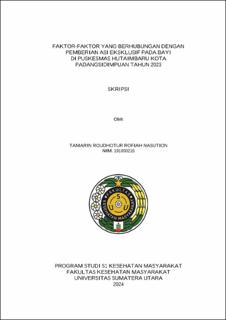| dc.description.abstract | The World Health Organization (WHO) recommends giving exclusive breastfeeding until 6 months of age and thereafter continuing with MPASI, and continuing to provide breast milk for up to 2 years. Exclusive breastfeeding is one of the government programs that the community must implement to improve the nutritional status of children. The low level of problems with exclusive breastfeeding is one of the problems that must be addressed immediately and cannot be ignored, because breastfeeding problems will have a negative impact on the growth and development directly on the lives of future generations. However, the coverage of exclusive breastfeeding in Padangsidimpuan City in 2021 is 28.98% and the coverage of exclusive breastfeeding at the Hutaimbaru Community Health Center is 7.6%. Therefore, exclusive breastfeeding coverage is still considered low because it has not yet reached the North Sumatra Provincial Health Service Strategic Plan target of 50%. The aim of this research was to determine the factors related to exclusive breastfeeding at the Hutaimbaru Community Health Center, Padangsidimpuan City in 2023. This type of research uses quantitative methods with a cross-sectional approach. The population of this study was all mothers who had babies aged 6-24 months who were registered at the Hutaimbaru Community Health Center, totaling 686 respondents and the sample in this study was 87 respondents with a sampling technique, namely purposive sampling. The analysis used was univariate and bivariate analysis with the chi-test. square. The results of the study showed that the variables related to exclusive breastfeeding were knowledge (p=0.000), culture (p=0.002), parity (0.049), type of delivery (p=0.000), family support (p=0.000), role health workers (p=0.000) while the unrelated variable is attitude (p=0.529). This research suggests that community health centers can make efforts to improve exclusive breastfeeding programs such as counseling and socialization about giving exclusive breastfeeding to mothers who have babies. | en_US |


